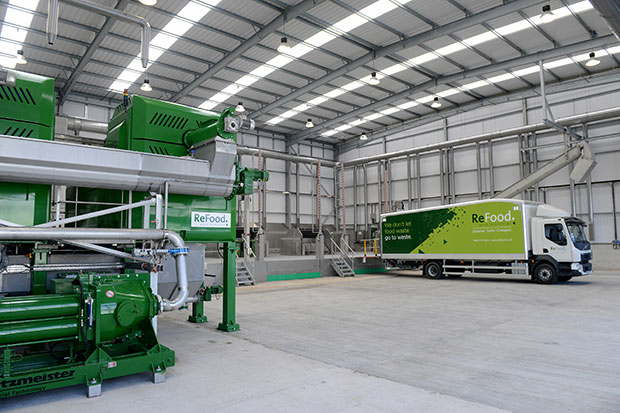Philip Simpson, commercial director at ReFood, discusses the findings of WRAP’s recent report into commercial food waste trends and explains why the supply chain must be prepared for further disruption as we head into 2023.
 Prior to the COVID-19 pandemic, WRAP’s Food Waste Roadmap reported an average 14,000 tonne decrease in food waste from participating producers and manufacturers (1.4%) between 2015 and 2020. Collectively, this totalled more than 1.2m tonnes of food waste, of which almost 80% was considered edible.
Prior to the COVID-19 pandemic, WRAP’s Food Waste Roadmap reported an average 14,000 tonne decrease in food waste from participating producers and manufacturers (1.4%) between 2015 and 2020. Collectively, this totalled more than 1.2m tonnes of food waste, of which almost 80% was considered edible.
However, by the end of 2021, these figures had risen by 100,000 tonnes, with 57% of suppliers admitting to seeing waste levels increase compared to their baseline and the vast majority reporting a clear spike during 2020. While it may not come as a surprise to many, the combined impacts of supply chain disruptions caused by Brexit and the devastating disruption of the coronavirus pandemic have taken the sector somewhat off-guard.
Indeed, economic challenges experienced during the past 36 months have been some of the most severe in living memory, resulting in delays, disruptions and, clearly, waste. While many businesses have fought hard to tackle the challenges head-on, survival and stability have overtaken environmental performance as immediate business priorities.
The obvious impact from a food waste perspective has been a rapid upward trend in volumes, despite the sector previously being considered on track to meet the UN Sustainable Development Goal 12.3 of halving food waste by 2030 against a 2007 baseline. The widespread impacts are clear, and make for challenging reading indeed.
While we may now be considered somewhat out of the woods when it comes to the worst of Brexit and COVID, it’s safe to say that 2023 will pose challenges of its own. It will take time for the supply chain to return to stability and, in the meantime, disruption will remain rife. The priority for businesses, therefore, is to act with flexibility and agility, while having the right partners in place to mitigate the impacts of unplanned change.
Redistribution on the rise
Although it may all seem like doom and gloom, a positive take-out from WRAP’s insight has been a reported increase in the volume of waste being redistributed. The 15 major retailers signed up to its Food Waste Roadmap increased their outputs by more than 100% (26,000 tonnes – worth £80m) as part of efforts to prevent wasted food from being landfilled.
This approach should be celebrated. Indeed, while supply chain disruption has proven hugely challenging from an operational perspective, ensuring that the value in waste isn’t simply lost remains an important business consideration. Following the food waste hierarchy is critical to achieving this.
Alongside embracing initiatives to tackle rising waste volumes and prioritising redistribution strategies, it’s therefore important to consider best practice approaches for the fraction of food that simply can’t be repurposed elsewhere. Amid supply chain challenges, damaged and spoiled produce tops this list.
At ReFood, we believe that food waste recycling should be prioritised as a solution to recover the value in unavoidable, unusable waste. While in no means the silver bullet, the process is a simple, cost-effective and sustainable alternative to more traditional waste management solutions.
Harnessing the anaerobic digestion (AD) process, organic material is broken down in the absence of oxygen, with the methane released captured accordingly. This gas – which would otherwise be released into the atmosphere if food waste was left to rot in landfill – can either be combusted to generate renewable electricity, or upgraded and injected directly into the national gas grid.
While food waste recycling doesn’t prevent the waste of food, it provides a robust solution to harness its value and minimise its environmental impact. Indeed, through our three AD plants in the UK, we process more than 400,000 tonnes of food waste every year, generating renewable energy and sustainable biofertiliser in result.
Having the support of a trusted partner
With supply chain disruptions expected to continue through 2023, having a reliable partner in place to support the impacts of unplanned change is important. With food waste often the first casualty, we have a responsibility – as an industry – to act quickly and decisively to minimise the negative consequences.
In an ideal world, data would continue to show a positive trend when it comes to food waste reduction rates across the UK. However, with the supply chain still in a fragile position, it’s clear that progress will be hampered. The priority should therefore remain to follow reduction strategies, wherever possible, yet to have a back-up plan in place to manage unforeseen circumstances and unavoidable waste fractions.
This will prove the first step to getting food waste reduction back on track – a hugely important task for businesses to embrace.
To find out more about ReFood, or its food waste recycling services, visit www.refood.co.uk.





Comments are closed.